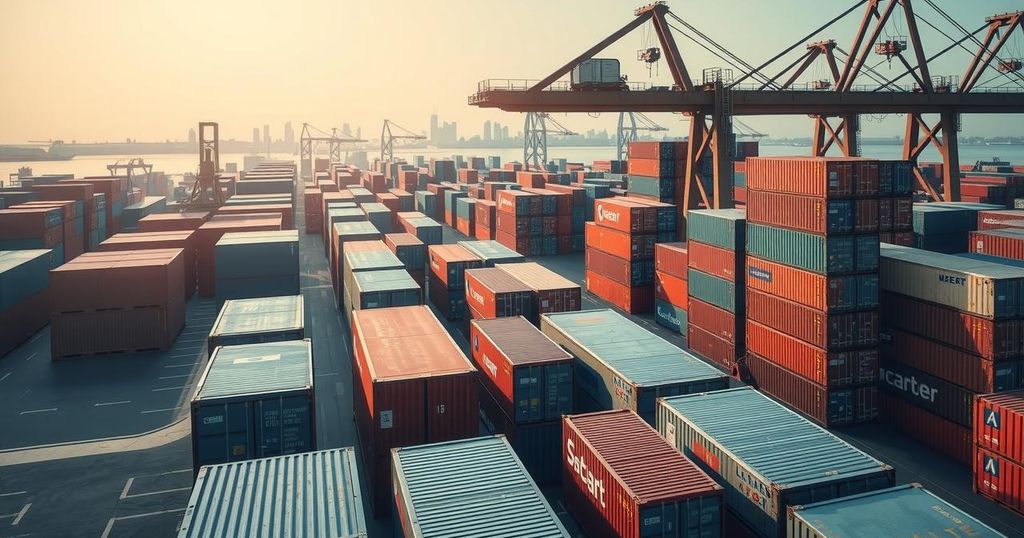President Trump has announced new tariffs on goods from Mexico, Canada, and China, citing protection of American interests and drug trafficking concerns. The tariffs range from 10% to 25% on various products, likely leading to increased consumer prices. Retaliation from Canada and condemnation from China are anticipated as these trade tensions escalate, potentially impacting overall inflation rates in the U.S.
On the weekend, President Donald Trump announced the imposition of tariffs on goods from Mexico, Canada, and China. He justified these tariffs by stating that they are necessary to protect Americans from illegal immigration and drug trafficking, particularly highlighting fentanyl, a potent substance causing numerous overdose deaths in the U.S. Trump also mentioned the possibility of tariffs on European Union goods and indicated that a negotiation might be possible with the United Kingdom.
Tariffs are essentially taxes levied on imported goods, which can take various forms. The current tariffs being imposed by Trump include a substantial 25% on products from Canada and Mexico, along with a 10% surcharge on goods from China. The impact of these tariffs typically results in additional costs that are often transferred to consumers, leading to higher retail prices for imported items.
The tariffs target Mexico, Canada, and China, fulfilling a campaign promise by Trump to impose import duties on major trading partners. The administration argues that such measures will boost U.S. manufacturing, protect jobs, and increase government revenue. Furthermore, Trump emphasized the use of tariffs as a strategy to combat fentanyl trafficking, claiming that the drug is trafficked from Mexico and that its precursors are sourced from China.
In retaliation, Canadian Prime Minister Justin Trudeau announced that Canada would impose 25% tariffs on $155 billion worth of U.S. goods. He encouraged Canadians to support domestic products amidst these tensions. Meanwhile, Mexican President Claudia Sheinbaum stated her government is considering both tariff and non-tariff measures to defend its interests against U.S. tariffs. China’s Foreign Ministry firmly criticized the U.S. decision and warned that no party benefits from trade wars.
The tariffs affect a wide range of products. Increases in prices for Mexican goods like fruits and vegetables are anticipated, while Canadian products such as steel and lumber are also expected to rise in cost. The automotive industry may face significant repercussions, with predictions that the average price of U.S. vehicles could increase by approximately $3,000 due to the tariffs.
Trump has also indicated that tariffs against the EU and the UK may be on the horizon, while suggesting potential negotiations with the UK. The UK’s Business Secretary, Jonathan Reynolds, believes that the UK should avoid tariffs due to a trade surplus with the U.S. The European Union, in turn, has stated that it would respond firmly to any tariffs imposed by the U.S., warning that a trade war would ultimately benefit China.
Regarding inflation concerns, economists hold that consumers will likely absorb a portion of the costs associated with these tariffs. Historical data indicates that tariffs from Trump’s previous term resulted in significant price increases for specific goods, such as washing machines. Reports estimate that these latest tariffs could potentially raise the annual inflation rate in the U.S. from 2.9% to approximately 4%.
The article discusses the recent decision by President Donald Trump to impose tariffs on goods imported from Mexico, Canada, and China. Tariffs have been a significant policy tool for the Trump administration as a means to protect U.S. industries and manage international trade relations. The economic implications of these tariffs can lead to increased consumer prices and inflation, raising concerns among economists regarding the potential for a trade war and its broader effects on the economy.
In summary, President Trump’s imposition of tariffs aims to protect American interests while addressing issues related to illegal immigration and drug trafficking. However, these tariffs are expected to result in higher prices for consumers and may incite retaliatory measures from affected countries. The potential escalation of trade tensions could have lasting implications for economic stability and inflation in the U.S.
Original Source: www.bbc.com






